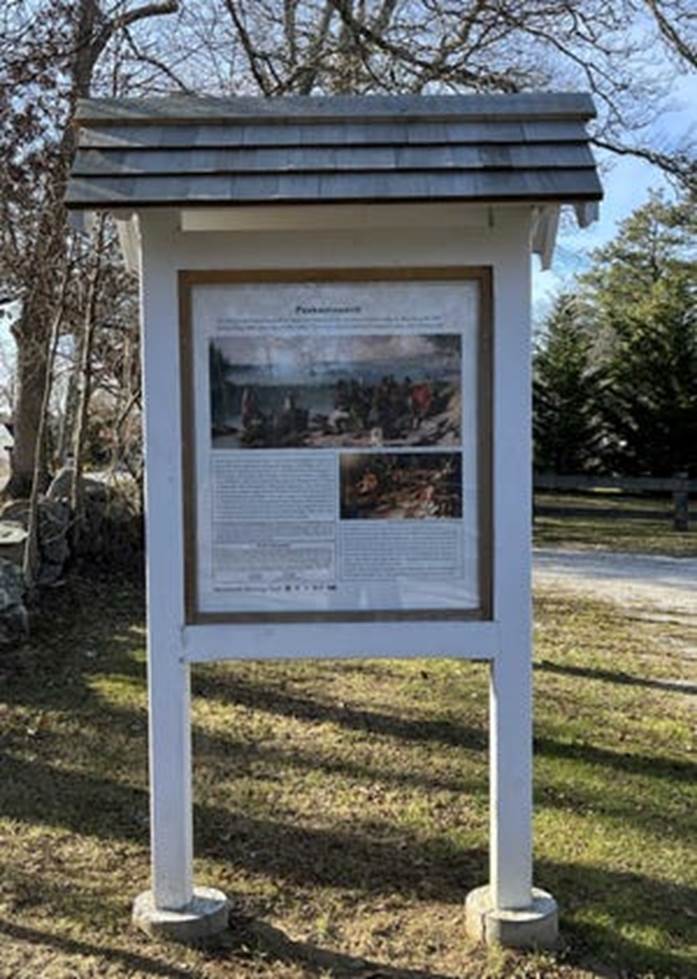Colleagues,
We are pleased to share this exciting collaboration between a vocational technical school’s Carpentry Department and Dartmouth’s Pathways Committee who oversaw the completion of the Heritage Trail.
“The students from GNB Vocational Technical did a marvelous job building and installing these two new kiosks,” Andrew Langhauser, project manager with the Dartmouth Pathways Committee, said in the press release. “The quality of construction and installation will ensure that these kiosks last a long time. The students were very skilled and professional, and I would hire them again in a minute."
David
What was life along the Paskamansett River like for indigenous people? New kiosk explains
Kathryn Gallerani The Standard-Times
Two new kiosks marking areas of historical importance from Dartmouth’s past signal the near completion of the Dartmouth Heritage Trail.
The Dartmouth Pathways Committee oversaw the completion of the Heritage Trail, which began in 2014 as part of Dartmouth’s 350th Anniversary celebration.
According to a press release, at the time, only eight of the proposed 10 kiosks were completed. The Pathways Committee saw an opportunity to finish the Trail and promote it for family recreation and to serve as a spur to the SouthCoast Bikeway.
Other locations of historical significance are being considered for future inclusion on the 32-mile trail.
What is there to learn from the new kiosks?
One of the new kiosks tells the story of Lincoln Park and the magic and memories it generated for many families for many years.
The Lincoln Park kiosk is located at the intersection of Reed Road and Beeden Road, at the southern end of the old amusement park.
The double-sided kiosk includes photographs and stories of the park in its heyday and why it was a destination for many families.
<![if !vml]> <![endif]>A second new kiosk tells the story of life of the indigenous people before European colonization.
<![endif]>A second new kiosk tells the story of life of the indigenous people before European colonization.
The Paskamansett kiosk is located in Paskamansett Park on Russell Mills Road, across the street from the Apponagansett Meeting House.
This double-sided kiosk offers a snapshot of life along the Paskamansett River hundreds of years ago and maps the different tribes that populated the area.
Who helped build and install them?
Carpentry students from the Greater New Bedford Vocational Technical High School helped complete the project by building and installing the kiosks.
The kiosks were built under the direction of carpentry instructor Jeffrey Foran and installed under the supervision of carpentry instructor Frank Goncalves.
“The students from GNB Vocational Technical did a marvelous job building and installing these two new kiosks,” Andrew Langhauser, project manager with the Dartmouth Pathways Committee, said in the press release. “The quality of construction and installation will ensure that these kiosks last a long time. The students were very skilled and professional, and I would hire them again in a minute."
What is the final phase of the project?
The last phase will be the installation of wayfinding road signs to help guide riders from village to village. A special Heritage Trail sign has been created to mark the trail.
This logo was created by students from Associate Professor Michele Bowers’ graphic arts class at UMass Dartmouth. An inaugural bike ride will be scheduled for this spring.
Who funded this project?
Funding was provided by the Dartmouth Rotary Club for the Paskamansett kiosk, Servedwell Hospitality for the Lincoln Park kiosk and the Dartmouth Community Preservation Committee. Storyboard content was created by Joseph Ingoldsby and printed by Signature Signs.
In addition to the two new kiosks, there are similar kiosks in Bliss Corner, Padanaram next to the fire station, Apponagansett Bay, Round Hill at the beach, Bakerville, Russell Mill, Hixville, and Smith Mills at Faunce Corner.
David J. Ferreira
MAVA Communications Coordinator
DavidFerreira




